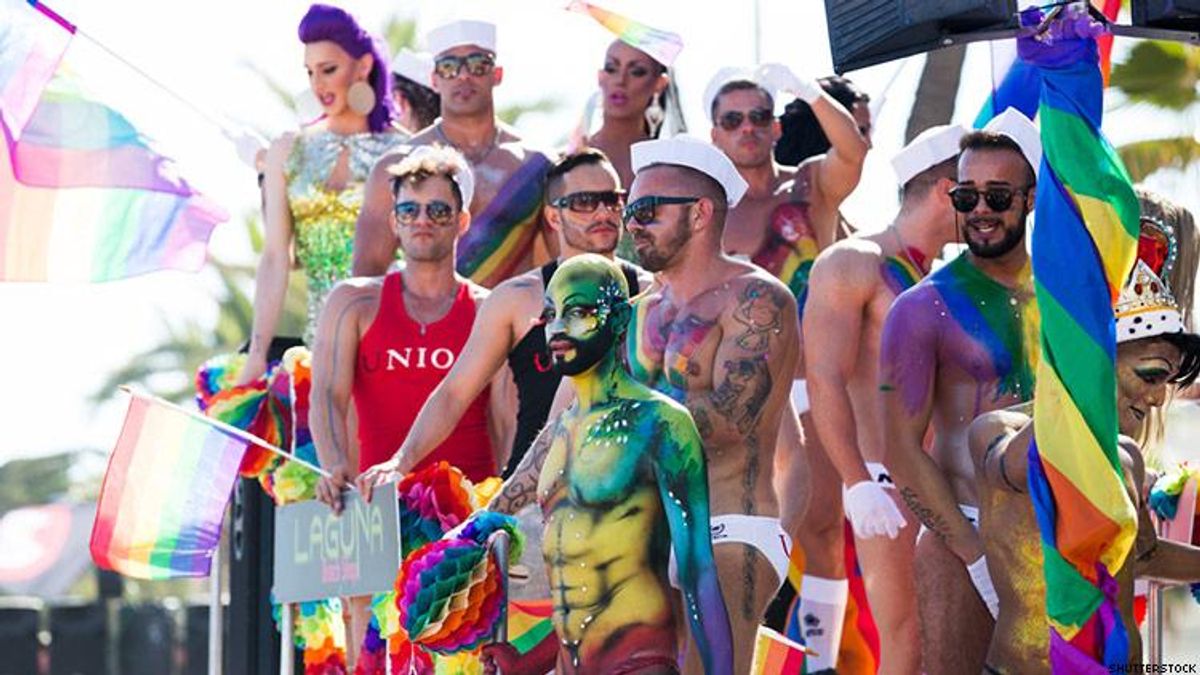Voices
Dear Brands: Support for LGBT People Should Last All Year

Corporate sponsorship of Pride festivals is fine, as long as the relationship is thoughtful and respectful.
May 29 2018 10:25 AM EST
May 31 2023 8:29 PM EST
By continuing to use our site, you agree to our Private Policy and Terms of Use.

Corporate sponsorship of Pride festivals is fine, as long as the relationship is thoughtful and respectful.
It's about that time of year again, when cities around the world are adorned in rainbows and play host to queer celebrations, parties, and parades. Our media becomes rife with advertisements showing pride, and many brands take every opportunity to remind us that they support LGBTQ+ people (read: consumers). Awareness and commercialization of Pride Month have grown in tandem with improving perceptions of queerness globally. But the fight is far from over, and to the brands that have adopted a one-month-only, superficial approach to allyship: You need to do better.
I recently came across a targeted advertisement for a branded pride fundraising event, inviting me to "party hard to save LGBTQ+ lives." I felt queasy reading the invitation. Without question this advertisement was the product of poor copywriting, but it is rooted in a frightening complacency. Lacking sensitivity and contextualized understanding, some of our most beloved brands are frequent perpetrators.
With the Supreme Court sending marriage equality nationwide, seemingly thousands of Pride events at the peak of their popularity, and universal adoration of out Olympian Adam Rippon, the LGBTQ+ rights movement may appear to be coasting on success. A global survey published in 2018 reports that nearly 57 percent of countries have shown increases in social acceptance rates of the LGBTQ+ community since 1981. Certainly, there is cause to celebrate.
But those same findings show a hyper-polarized world -- countries with the highest acceptance rates increased exponentially, while countries with the lowest scores are plummeting. Existing in liberal bubbles, prominent brands may be unaware that many LGBTQ+ people continue to live in persecution, in countries where doing so openly is illegal (over 70 to be exact).
And of course, persecution of LGBTQ+ people exists well within American borders. This Pride Month I am reminded of the 49 lives lost at the Pulse nightclub in Orlando two years ago, in the most violent act of domestic terror since 9/11. Transgender people are murdered in the dozens each year. The rights movement didn't end with marriage equality in the United States.
In 2017, the New York City Pride March boasted 61 corporate sponsors, 13 promotional partner and 31 media sponsors, according to MarketWatch. Every year the number of participating brands has grown. Though the volume of support has increased, I fear the quality will not.
As a consumer, I am engulfed by "limited-edition" rainbow products that, at best, send a portion of the proceeds to a charity or noteworthy cause. I'm surrounded by "inclusive" ads featuring only white cisgender gay couples. While brands are often criticized for tone-deaf or half-hearted efforts, we see mistakes happen again and again.
True advocacy for the LGBTQ+ community extends beyond a sponsored mixer, rainbow logos, or well wishes. To tout oneself as an ally to the community, brands must respect the historical significance of Pride marches and empower meaningful action.
The first major Pride March and rally was organized almost 50 years ago, observed on the first anniversary of the Stonewall riots. Back then activists were risking arrest in solidarity.
By nature, Pride events are spaces in which everyone is welcome -- including brands. Recognizing that the Pride events will likely never get less commercial, take note: There is an enlightened approach to marketing for this consumer segment. Brands can and should still take part in the celebration, but only if done so thoughtfully. As one of the many lenses through which people view the world, brands have a unique opportunity to take a stand and make a meaningful impact this Pride Month (and year round). The key is to remember that Pride Month is rooted in riot. Every powerful action brings us one step closer to equality.
Recently, brands have demonstrated meaningful commitment to social change at the benefit of LGBTQ+ people. When North Carolina passed legislation preventing transgender individuals from using their preferred bathrooms, several brands, including Google, IBM, and PayPal, voiced disappointment and continued support of LGBTQ+ employees. The likes of Deutsche Bank and Lionsgate truly made an impact -- the former suspended plans for expansion and the latter ceased business operations completely until the legislation was repealed.
I look to the March for Our Lives Movement against gun violence and the Women's Marches as inspiration; thousands of people marched on Washington this year in protest of senseless acts of gun violence and discrimination against women. And many brands notably followed suit, cutting ties with the National Rifle Association to take a stand against gun violence.
Cutting business ties in solidarity is a powerful demonstration, and may even pay off long-term from a business perspective: another study found that two-thirds of American consumers now find it important that brands take a stand on social issues.
The first step for brands that seek to empower their LGBTQ+ employees and consumers -- especially during pride month -- is to remember that this is not your party. In fact, it really isn't a party to begin with; it's an act of resistance and protest to all the spaces in the world where queerness is still unwelcome (albeit sometimes a really fun act of resistance).
So continue to raise a glass, attend those galas, and tweet your encouragement -- but brands can't forget to rise up. Meaningful allyship requires more than just the fun stuff.
BILLY LEPAGE is a New York-based global analyst at OgilvyRED.